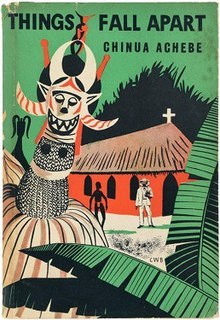The quote “When Unoka died he had taken no title at all and he was heavy in debt. Any wonder then that his son Okonkwo was ashamed of him? Fortunately, among these people a man as judged according to his worth and not according to the worth of his father.” contains a hint of sarcasm. Achebe is suggesting that this is not the case for the white man. Despite their supposed superiority, they fail to get this simple concept right. The African tribe in the novel has a better merit-based promotion system. The warrior Okonkwo has the opportunity to prove himself regardless of what is happening in the more “civilised” part of the world. This is the essence of the novel. Achebe gives the black man a voice, along with culture and civilisation. These men are not unjustly represented. He is directly addressing the ignorant trend in Victorian literature that depicted the colonised as unintelligible and voiceless, as savages. Achebe presents us with the reality.
The quote “If you don't like my story, write your own” sums it up perfectly. And that is precisely what Achebe did himself. He makes no judgments. His protagonist is completely flawed. Okonkwo is without mercy and has earned his fame and respect. So, when an untitled youngster speaks out, he is immediately filled with anger. This is his hamartia, his tragic flaw. He must overcome this and treat his fellow tribesmen with a certain degree of dignity. However, he is a slow learner. And who can blame him? Despite his brutality and misogyny, this is still his culture. It is all he has ever known, and whether it is right or wrong doesn't matter. Granted, not all the men are as extreme as him. He uses his position to extract violence more than most. His wives often bear the brunt of his rage, much to their misfortune. He may sound like a bad man, but that's not the point. Achebe’s meaning and the power of this story are revealed at the end.
I found this to be very unusual yet highly effective. The novel aims to show how uncompromising the white man is. The Nigerian culture and the way of life of the tribe in the novel are forced to change; otherwise, they will be completely destroyed. The protagonist represents this struggle. He has a choice: either accept the white man’s way and be forever changed, or stick to his own customs and ultimately fail.
Language is the key. The Igbo people highly regard the art of conversation, and proverbs are like the palm-oil with which words are eaten. Africa does not have a silent culture. Conrad’s Heart of Darkness was incorrect. African language is formal, developed, and intelligent. In Nigeria, it is the conduit for the Igbo culture, rich in oral tradition. Achebe recognizes that accepting a new language means shunning the original culture. He shows that Igbo tradition depends on storytelling and language, and accepting English would destroy Igbo traditions. It would alienate Africans from their culture. Therefore, resistance, however futile, is the natural and just response. Okonkwo’s reactions are deeply symbolic of a culture on the verge of collapse.
I believe Achebe is trying to portray the silence of the African voice. It had no say. It didn't matter if the colonisers were kind or brutal, or what the Nigerian culture was like in terms of ethics. What mattered was that it was taken away or shaped into something else entirely. This was not progress but assimilation. All cultures have their flaws, which is true for any society. However, the white culture, for all its self-aggrandisement, was simply imposing. And for Achebe, this was the ruination of the voice he was trying to convey.
The quote “The white man is very clever. He came quietly and peaceably with his religion. We were amused at his foolishness and allowed him to stay. Now he has won our brothers, and our clan can no longer act like one. He has put a knife on the things that held us together and we have fallen apart.” encapsulates this idea.













